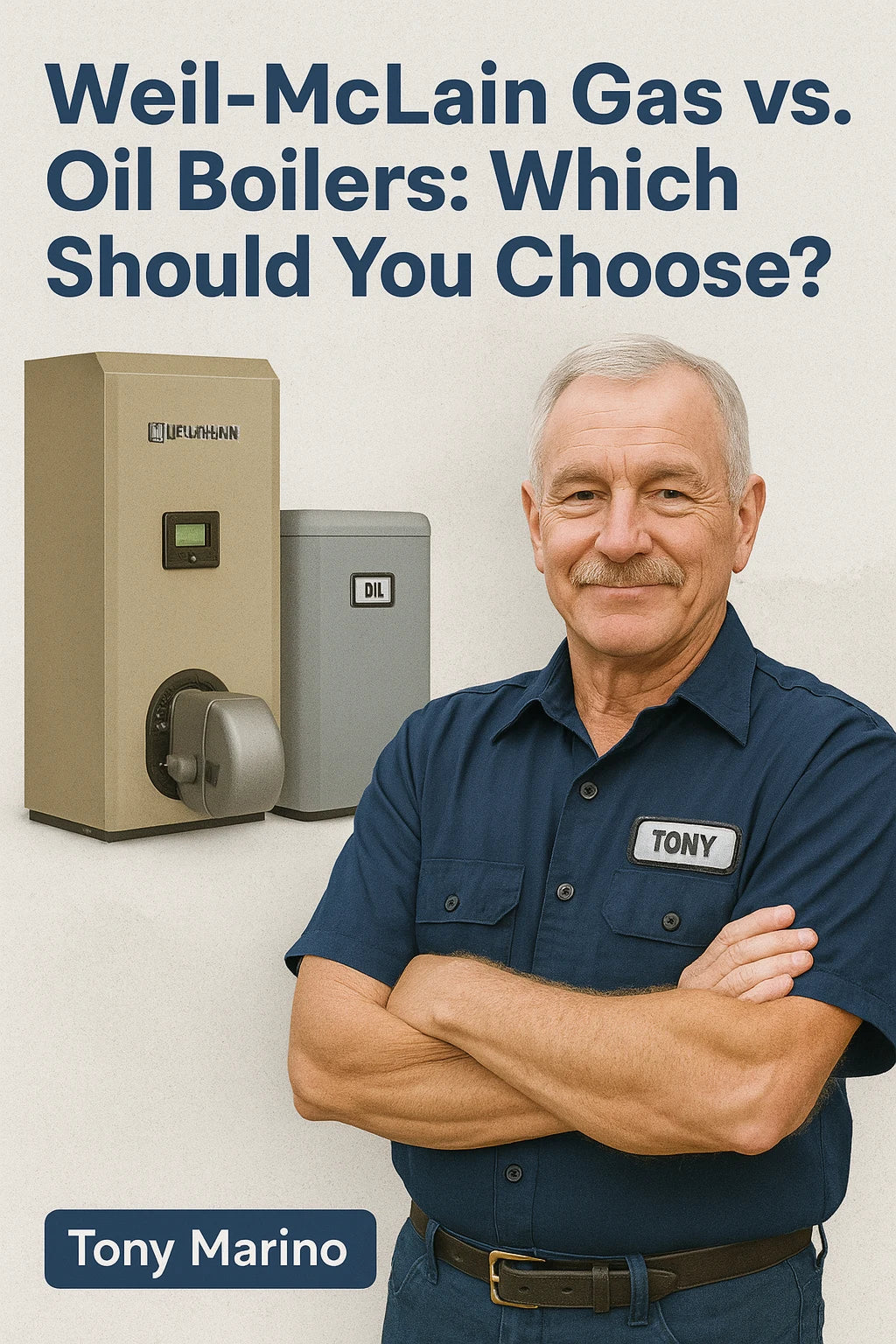📊 Why Fuel Type Matters When Choosing a Boiler
Choosing between a gas or oil-fired Weil-McLain boiler impacts not only upfront costs but also long-term fuel expenses, maintenance, and even home resale value. Tony has seen many homeowners save thousands annually by aligning the right fuel type with their region, climate, and lifestyle.
This guide will help you determine:
-
Whether gas or oil is better for your home.
-
Long-term operational and maintenance differences.
-
How your climate and home size affect your choice.
-
Which Weil-McLain models fit best for each fuel type.
💧 Fuel Availability: What Does Your Home Support?
Natural Gas:
-
Typically available in urban and suburban areas.
-
Requires a gas line connection.
-
Lower fuel cost per BTU compared to oil.
Propane:
-
Used in rural areas where natural gas is not available.
-
Delivered by truck and stored in on-site tanks.
-
Higher operational costs than natural gas.
Oil:
-
Available nearly anywhere.
-
Delivered by truck and stored in an on-site tank.
-
Can be more expensive and price volatile.
Check local availability and pricing trends using EIA’s Heating Fuel Comparison.
🌧️ Fuel Costs and Price Stability
Natural Gas:
-
Historically the lowest cost per BTU.
-
Prices are generally stable with modest fluctuations.
-
Lower emissions profile.
Oil:
-
Prices fluctuate significantly with global oil markets.
-
Higher operational costs per BTU.
-
Higher carbon emissions per BTU.
Example: In 2025, average residential heating fuel prices were:
-
Natural Gas: ~$13.50 per thousand cubic feet.
-
Heating Oil: ~$4.00 per gallon.
See up-to-date comparisons on the U.S. Energy Information Administration.
🌍 Climate Considerations
In colder climates (Zones 5-7):
-
Oil systems deliver high BTU output, making them effective during harsh winters.
-
Gas systems with modern high-efficiency designs match these outputs while consuming less fuel.
In moderate to warm climates (Zones 1-4):
-
Natural gas systems are ideal due to mild winters and lower heating demands.
-
Oil systems are often overkill for regions with shorter heating seasons.
Refer to Energy Saver’s Guide for more climate-specific heating insights.
🛠️ Installation Costs: What to Expect
Gas Boilers:
-
Require venting and gas line installation if not present.
-
Typically easier and cleaner to install than oil.
-
May qualify for rebates and tax incentives.
Oil Boilers:
-
Require an on-site storage tank.
-
May require chimney liners or direct venting solutions.
-
Generally higher install costs due to additional piping and tank maintenance.
For a realistic estimate of boiler installation, see HomeAdvisor’s Cost Guide.
🧩 Maintenance Requirements and Lifespan
Oil Boilers:
-
Require annual cleaning of soot and scale.
-
Oil filters and nozzles need replacement.
-
Generally have robust construction and long service life.
Gas Boilers:
-
Require annual inspections but less cleaning.
-
Fewer moving parts and cleaner combustion.
-
Tend to have a lower maintenance cost annually.
Tony advises scheduling annual maintenance to avoid unexpected issues regardless of fuel type.
🌌 Emissions and Environmental Impact
Natural Gas:
-
Lower CO2 emissions compared to oil.
-
Cleaner combustion results in less soot.
Oil:
-
Higher CO2 emissions.
-
Potential for spills during refueling.
-
Soot production requires additional cleaning.
For an environmental breakdown, visit EPA’s Home Heating Guide.
🏡 Weil-McLain Models by Fuel Type
Weil-McLain Gas Boilers:
-
Evergreen High-Efficiency Boiler: Modulating, 95% AFUE.
-
Ultra Series 3: Condensing, quiet operation, advanced control system.
-
AquaBalance Series: Compact, wall-mounted, up to 95% AFUE.
Weil-McLain Oil Boilers:
-
WTGO Series: Cast iron, tankless heater option, high reliability.
-
WGO Series: Flexible venting, easy maintenance access.
-
SGO Series: Steam oil boiler for older home radiators.
Explore detailed model specs at the Weil-McLain Collection on The Furnace Outlet.
🌱 Energy Efficiency and Rebates
Natural Gas models often qualify for rebates through Energy Star and local utility programs due to high AFUE ratings.
Oil models may qualify for rebates if they meet specific efficiency thresholds.
Check the Database of State Incentives for Renewables & Efficiency (DSIRE) to find rebates for your state.
🫶 Tony's Recommendations
-
If you have access to natural gas, it is usually the most economical and practical choice.
-
If you live in a rural area without gas lines, an oil boiler may be a viable, powerful option for cold climates.
-
Consider future energy trends and local fuel price stability.
-
Factor in annual maintenance costs and system lifespan.
-
Always size your boiler correctly to your home's heating demands.
🚀 Summary: Which Should You Choose?
Choose Gas If:
-
You have a gas line available.
-
You want lower operational costs.
-
You prefer lower emissions.
Choose Oil If:
-
You live in a rural area without gas access.
-
You need high heat output for harsh winters.
-
You are prepared for higher maintenance needs.
Both options deliver reliability under Weil-McLain’s proven engineering. The best choice depends on your fuel availability, budget, and heating needs.
🛠️ Ready to Choose Your Weil-McLain Boiler?
View the current models in the Weil-McLain Collection and request a quote to match your home’s heating needs with the right fuel type today.
In the Next topic we will read more about: How Much Does a Weil-McLain Boiler Cost? Real-World Estimates & Rebates







